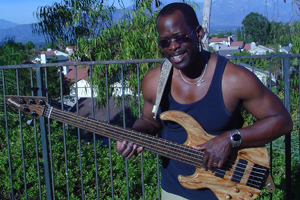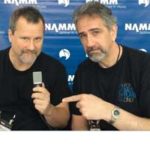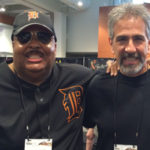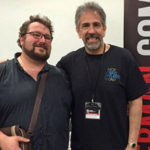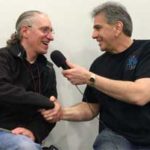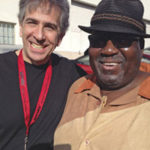Funk/rock enthusiast tells FBPO how his company, Singleton Guitars, became a hit with guitarists – and bassists!
Exclusive interview with FBPO’s Jon Liebman
February 17, 2014
Touch Singleton is the founder of Singleton Guitars in San Dimas, CA. Growing up immersed in the popular music of the ’60s and ’70s, Touch was destined to make his way in the music world, one way or another. After playing in several bands and doing a bit of touring, Touch, a self-proclaimed “tinkerer,” found himself gravitating toward the technical side of the guitar world, eventually starting his own business, Singleton Guitars.
Once becoming established as a maker of fine guitars, Singleton expanded his business to include basses, which quickly became popular among discerning players. FBPO’s Jon Liebman went one-on-one with Touch in this exclusive interview.
FBPO: Tell me about your musical upbringing.
TS: My musical up bringing consisted of sounds all around me, the sounds of the late ’60s and early ’70s. As a teenager, I was immersed in the music of Sly & the Family Stone, Jimi Hendrix, the Bar Keys, Funkadelic, Miles Davis, RTF, Tower of Power, Eric Clapton, Kool & the Gang, Earth, Wind & Fire and Santana. All of these artists could be heard all day long on the radio stations coming out of New York City at that time so that was the stuff I fell in love with. My older cousin turned me on to Jimi Hendrix and that made me want to switch from drums to guitar. As a teenager I played in a couple of bands, doing Sly tunes, EWF tunes, James Brown, Funkadelic and all that kind of stuff. Then, in my early twenties, I played in a show band, touring around the New England area.
FBPO: How did you get involved in the technical side of guitars?
TS: I was always a tinkerer, curious about what was inside things and what made them work. I would take things apart to see what they looked like inside: the radio, the tape recorder, my first guitar. I guess that’s what caused me to go to school for electronics. I figured if I’m gonna play guitar, I might as well know how to fix my gear. In 1976, I started doing setup work and repair in a little guitar shop in New Haven, CT. The bulk of the jobs were setups and installing the latest thing at the time, the “Super Distortion” pickups by DiMarzio.
FBPO: What made you decide to open your own business? That must have taken some guts!
TS: I had made several attempts to create a blend of a “Strat” and a “Les Paul” and I liked the results. I knew I had a good product and I believed other guitarists would like my designs as well. By this time, I was living in LA and had done repair work for several of the working guitar professionals in Southern Cal. It only made sense that I should do the thing I loved next to playing: building guitars. Yes, it took some guts, mainly because there were so many great luthiers in SoCal and I knew it would be a hard struggle to compete with those names. But doing what I do, building and playing is in my heart. It’s me!
FBPO: What differentiates Singleton Guitars from all the others?
TS: My guitars and basses are different from other instruments out there because they have “me” in them. All my guitars are completely made by me, no CNC, no necks or bodies turned out of a factory and “assembled.” No, each guitar is custom and hand-crafted from my heart to create an instrument that is able to deliver the tone and playability I would be proud to play myself. You see, I am still very much a guitarist and I still keep active as a working musician. For that reason, I don’t just spit out guitars. Each guitar – and bass! – in the Singleton line has a focus on a certain tone and functionality.
FBPO: At what point did you expand into making basses too?
TS: Several years ago, while playing in my jazz band, my bass player asked me to make him a bass, to which I replied, “There are so many great basses out there. I build guitars. Why don’t you just pick up an F-bass or something?” Then I thought about it and I said to myself, “Why don’t I do basses?!” I could simply apply the same concept of using select tone woods with my eye for design, detail and the best electronics and hardware and, of course, my “heart,” which is what I do with my guitars. It made sense. Make a bass that has its own niche because of the aforementioned criteria. The result was the Sensei5 bass. Eight years later, this bass has one of the best tones you’ll find anywhere on the planet!
FBPO: Who are some of the artists that use Singleton basses?
TS: Playing my basses I have people like Charles Glenn (Little Richard, Teena Marie, Ozone), Reggie McBride (Keb Mo, Robert Cray, Eagles), Rayf Gilliard (LA session player, Bobby Womack), Zach Randolph (gospel session player) and we just finished a Stanley Clarke Signature model.
FBPO: Feel free to throw in a few guitar players’ names too!
TS: For my guitars I have: Jeff Richman, David Gilmore, Oz Noy, Ray Fuller, Dean Brown and several others.
FBPO: What kind of feedback do you get from the artists who play Singleton? What do they like about your brand?
TS: I am very blessed to have worked with these artists which are now in the “family.” Here are a few quotes:
“The attention to detail and sound palette are rare, even in the world of custom instruments.’ – Dean Brown
“On my guitar, the action is perfect. It’s effortless, real easy and smooth to play. It’s almost like I can play faster on this instrument!” – Jeff Richman
“I owned nineteen basses, from vintage Fenders to Ken Smiths, for session work and could cover any situation. But this bass has its own voice that I couldn’t find in any of the others. I now own twenty basses!” – Reggie McBride
“I am extremely ecstatic about my Singleton bass. It has really clean low end and very clear highs for a well-balanced sound. After a 25-year run without ever having to purchase a bass, I played the Singleton line and had to have one.” – Charles Glenn
FBPO: How about the future? What else can we look forward to from Touch Singleton and/or Singleton Guitars?
TS: I will continue honing my craft and skills and add some more professional bassists and guitarists to the Singleton Guitars family. As for new models, I do have some new products coming down the pike. Please follow us and we’ll keep you informed as they develop.
FBPO: What would you be if you weren’t in the business of making guitars and basses?
TS: I have a love of people! If I wasn’t playing guitar or building guitars, I would be in the industry of feeding into people’s lives. I don’t know exactly what it would be, but it would be some kind of business that involved enriching individuals’ lives. I know that there is a “purpose” for each one of our lives here on this planet. I happen to know mine and that is to touch peoples’ lives, feed into someone or somebody on whatever scale that might be, sometimes big, sometimes small. It just so happens that I am very fortunate to be able to do that with what I do musically and with Singleton Guitars. I am truly blessed.
